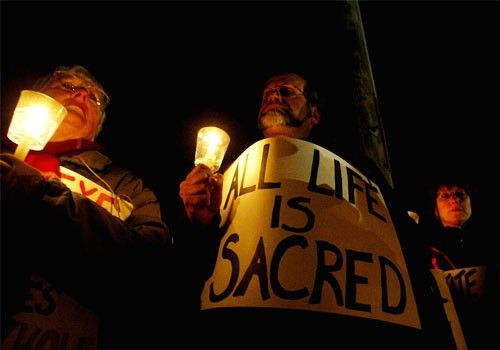Majority of Americans favor, want more death penalties: Gallup survey

Sixty-four percent of Americans support death penalty for those convicted of murder while one of two Americans feels death penalty is not imposed often enough, Gallup's annual Crime Survey has revealed.
According to the survey, 64 percent Americans favor death penalty for people who are convicted of murder, while 29 percent oppose it. Opponents of death penalty claim DNA tests and other evidence have often shown that individuals who have been sentenced to death were, in fact, innocent.
Opponents also feel that the death penalty is applied unfairly in the U.S. According to them, members of certain minority groups are more likely to receive the death penalty than others convicted of the same crimes, or that the arbitrary differences in trial procedures, judges, and jurisdictions can make a difference in who receives the death penalty and who doesn't, Gallup said.
The death penalty in murder case survey is one of Gallup's oldest, dating back to 1936. At that time, 59 percent Americans favored the death penalty while 38 percent opposed it.
The maximum support for death penalty was recorded in 1994 when 80 percent of Americans favored it. However, during 1957 and 1972, less than 50 percent of the Americans had favored it. In 1966, only 42 percent of Americans supported death penalty - an all-time low.
According to the latest survey, Americans were, however, split on deciding whether they favored death penalty or life imprisonment with no possibility of parole. While 49 percent of the Americans favored death penalty, 46 percent opted for life imprisonment. However, prior to 2000, support generally tilted more strongly toward the death penalty option, Gallup said.
The latest survey also suggests that men, whites and Republicans are the biggest supporters of death penalty though women, non-whites and Democrats also approve of the capital punishment.
The survey result was released on Monday, the very same day that a jury in New Haven Superior Court, Connecticut, decided unanimously that Steven Hayes should receive the death sentence for committing a brutal home invasion robbery that included sexual assault and murder of a doctor's family.
The death penalty was a key issue of debate in the governor's race in many states, especially in Connecticut, where only one man has been executed in the last 50 years. Not surprisingly, nearly half of the Americans (49 percent) in Gallup's survey feel that death penalty is not imposed often enough compared to only 18 percent who say it is imposed too often.
About Capital Punishment in the United States
The United States is one of the few countries in the world where capital punishment still exists. However, not all U.S. states have capital punishment. in fact, some while some jurisdictions have banned it and some others have suspended its use, there are yet others who are trying to expand its applicability.
The methods of execution and the crimes warranting capital punishment vary by jurisdiction and have varied widely throughout time. Currently, capital punishment applies in most jurisdiction only for aggravated murder and more rarely for felony murder or contract killing. Treason is a capital offense in several jurisdictions. Other capital crimes include: the use of a weapon of mass destruction resulting in death, espionage, terrorism, certain violations of the Geneva Conventions that result in the death of one or more persons, and treason at the federal level; aggravated rape in Louisiana, Florida, and Oklahoma; extortionate kidnapping in Oklahoma; aggravated kidnapping in Georgia, Idaho, Kentucky and South Carolina; aircraft hijacking in Alabama; drug trafficking resulting in a person's death in Connecticut and Florida; train wrecking which leads to a person's death, and perjury which leads to a person's death in California.
© Copyright IBTimes 2024. All rights reserved.





















